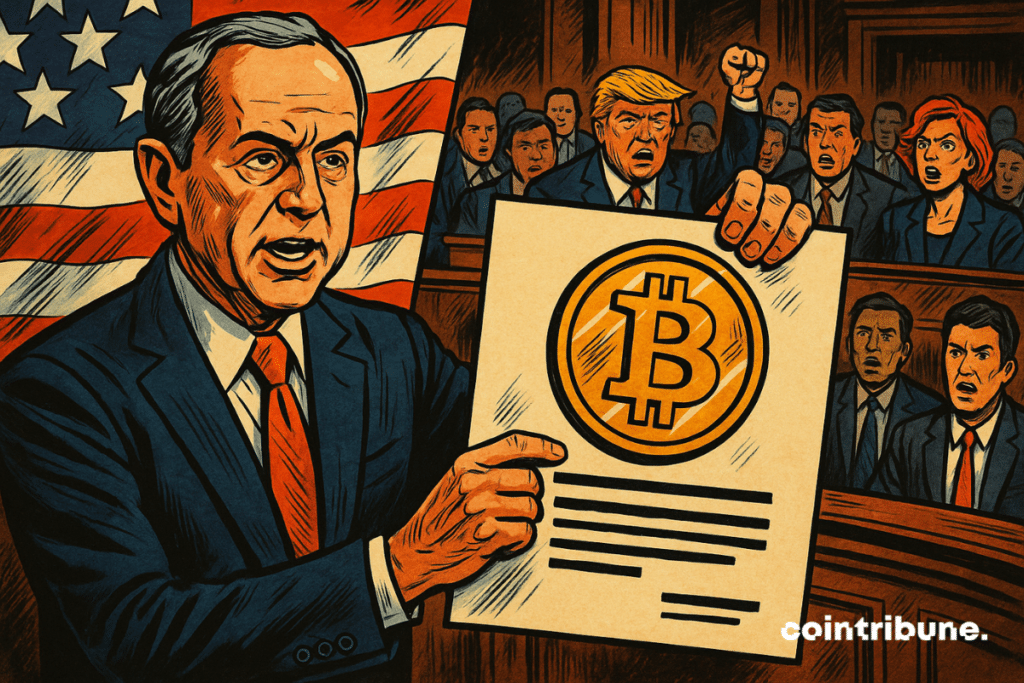Crypto: Democrats Want To Regulate Trump’s Influence In The Ecosystem
Trump rewards holders of his memecoin at a private dinner. Immediate reaction: Adam Schiff, Democratic senator, proposes a law to regulate the use of crypto by political officials. A confrontation combining digital assets, conflicts of interest, and electoral calculations.

In brief
- Adam Schiff proposes the COIN Act to prohibit political officials from exploiting cryptocurrencies before, during, and after their term.
- The law targets Donald Trump, accused of profiting from the family crypto platform World Liberty Financial.
- The project comes after a private dinner organized by Trump to reward major holders of his memecoin.
A law to cut off the crypto flow at the source
Adam Schiff was outraged. While Donald Trump shows growing friendliness toward the crypto community, the California senator raised alarms over a controversial private dinner that has divided investors and observers alike. According to him, the former president uses digital assets as a lever for personal enrichment. He therefore responds with a bill: the COIN Act (Curbing Officials’ Income and Nondisclosure).
Objective: to prevent presidents, vice presidents, and senior officials from creating, promoting, or investing in cryptos, NFTs, or stablecoins during their term and up to two years after. The message is clear: decentralized finance must not become a refuge for institutional conflicts of interest.
This project targets Trump directly, who is alleged to have earned more than $57 million via World Liberty Financial, a crypto platform supported by his own family. Schiff sees this as a clear abuse of power for private purposes. He is not talking about technology, but political morality.
Memecoins, stablecoins, and dollars coming from the Gulf
The detail that ignited criticism? The launch of the stablecoin USD1 by World Liberty Financial. Soon after, an Abu Dhabi company announced its intention to use it to settle a massive investment of $2 billion in Binance. The operation seems legal but raises a scent of disguised economic diplomacy.
Meanwhile, the Trump family reduced its stake in WLF from 75% to 40%. A partial exit that would have yielded several million dollars. According to an independent report, the president’s digital holdings would represent nearly $3 billion, or 40% of his personal wealth. This is more than a detail: it is a warning sign for Schiff, who sees it as a quiet takeover of public debate by private financial interests.
This mix of political influence and monetary innovation worries as much as it fascinates. Crypto is becoming a tool of personal soft power, difficult to regulate by laws designed for another century.
From the Senate to the polls, crypto as a dividing line
Adam Schiff is not alone in wanting to regulate the wave. In the House, Maxine Waters has proposed the TRUMP in Crypto Act, a deliberately provocative bill intended to block the political use of memecoins by the former president. The timing is no coincidence: this project came out the very day Trump was receiving his main token investors.
But the parliamentary reality complicates everything. Democrats are in the minority, and even if both bills passed, a presidential veto would remain likely. A supermajority would then be needed, which no one seems able to gather today.
The real stake is playing elsewhere: in public opinion. These legislative proposals, even doomed to fail, impose a new debate. Crypto is now a tool of influence, a campaign product, sometimes even a substitute for traditional regulation.
With this bill, Schiff is not just seeking to regulate. He is trying to draw a red line between political power and crypto finance. Whether this boundary is accepted or not, one thing is sure: the blockchain is no longer just a technology. It is an electoral issue, a narrative weapon, a contested territory.
Maximize your Cointribune experience with our "Read to Earn" program! For every article you read, earn points and access exclusive rewards. Sign up now and start earning benefits.

Fascinated by Bitcoin since 2017, Evariste has continuously researched the subject. While his initial interest was in trading, he now actively seeks to understand all advances centered on cryptocurrencies. As an editor, he strives to consistently deliver high-quality work that reflects the state of the sector as a whole.
The views, thoughts, and opinions expressed in this article belong solely to the author, and should not be taken as investment advice. Do your own research before taking any investment decisions.